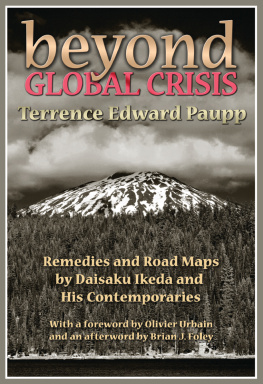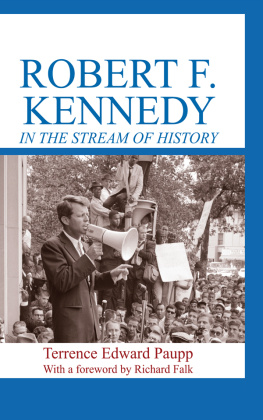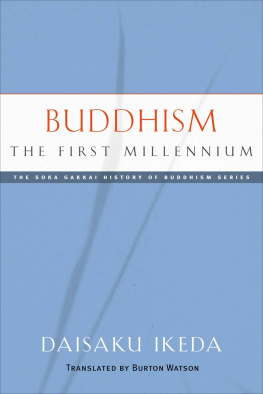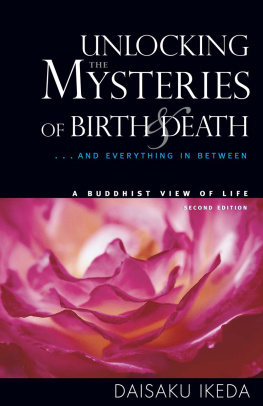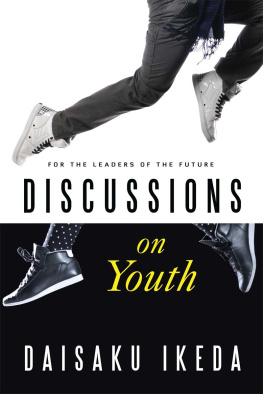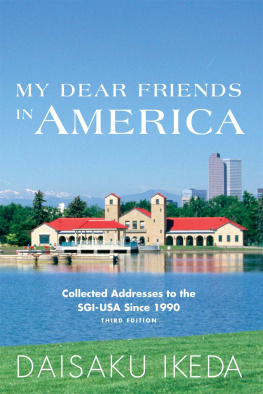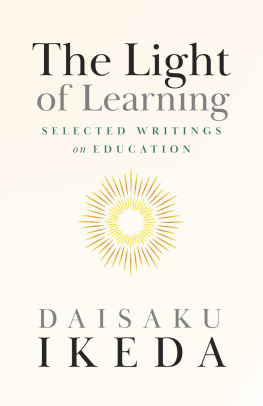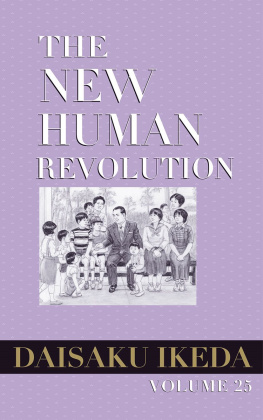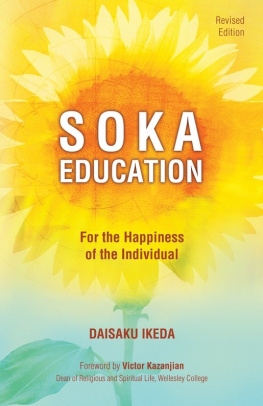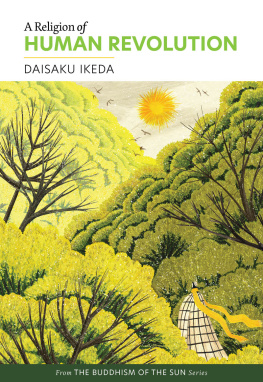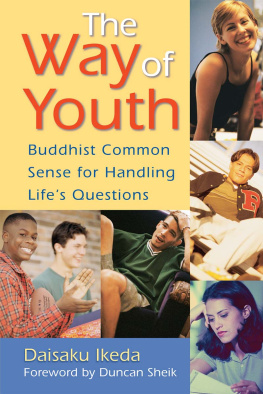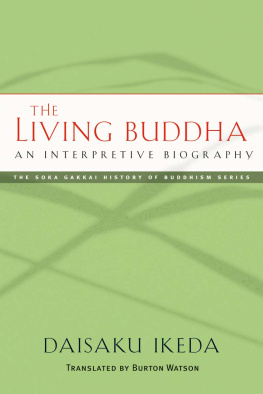First published 2012 by Transaction Publishers
Published 2017 by Routledge
2 Park Square, Milton Park, Abingdon, Oxon OX14 4RN
711 Third Avenue, New York, NY 10017, USA
Routledge is an imprint of the Taylor & Francis Group, an informa business
Copyright 2012 by Taylor & Francis.
All rights reserved. No part of this book may be reprinted or reproduced or utilised in any form or by any electronic, mechanical, or other means, now known or hereafter invented, including photocopying and recording, or in any information storage or retrieval system, without permission in writing from the publishers.
Notice:
Product or corporate names may be trademarks or registered trademarks, and are used only for identification and explanation without intent to infringe.
Library of Congress Catalog Number: 2011042480
Library of Congress Cataloging-in-Publication Data
Paupp, Terrence Edward.
Beyond global crisis: remedies and road maps by Daisaku Ikeda and his contemporaries / Terrence Edward Paupp; with a foreword by Olivier Urbain.
p. cm.
Includes bibliographical references and index.
ISBN 978-1-4128-4616-5 (acid-free paper)
1. Conflict managementInternational cooperation. 2. PeaceInternational cooperation. 3. Human securityInternational cooperation. 4. PeaceSocial aspects. 5. Human securitySocial aspects. 6. United NationsReform. 7. Conflict managementPhilosophy. 8. Ikeda, DaisakuPolitical and social views. I. Title.
JZ5601.P38 2012
327.172dc23
2011042480
ISBN 13: 978-1-4128-4616-5 (pbk)
For many decades, Daisaku Ikeda has proposed solutions for world problems and built networks of solidarity across spiritual, geographical, cultural, and social boundaries. For more than six decades of activities for peace (1947present), Ikeda has shown his capacity to weather crises at the local, national, and global levels when it comes to the development of the worldwide grassroots movement of which he is the leader, the Buddhist lay organization Soka Gakkai International (SGI), which has more than twelve million members worldwide. Moreover, the many institutions he has established in the field of peace, culture, and education are all part of a global network.
These networks all share the common characteristic of advancing the cause of peace and global human solidarity. In the present book, Beyond Global Crisis, the esteemed scholar Terrence E. Paupp has written a groundbreaking original new work bridging Eastern and Western thought, advancing a road map for the achievement of international peace. It is inclusive of Ikedas philosophy and also the work of a variety of Western scholars and leaders who are introduced throughout this book as persons whom Paupp calls contemporaries of Ikeda.
The first foundational work that systematizes and explains the central components of Ikedas philosophy from the 1940s to the present was laid out in my book, Daisaku Ikedas Philosophy of Peace (Urbain 2010). What was left unaddressed by my work is now taken to the next level by Paupp, who has published extensively on issues of governance, international law, and international relations (Paupp 2000, 2007, 2009). In Beyond Global Crisis we find Paupp addressing the challenges of how best to implement Ikedas philosophy of peace and the road map that he has provided in the decades since the 1940s in the form of books, annual proposals to the United Nations, dialogues with world leaders and intellectuals, as well as editorials, speeches at universities and colleges, and in his various leadership roles as the head of SGI.
Yet this book is not merely seeking to be a tribute to Ikeda, but rather an appreciation and acknowledgment of his unique contributions to peace. We find, in , that Paupp is engaged in presenting a scholarly work that unites the central tenets of Ikedas philosophy of peace in a comparative and interdisciplinary approach with those of other thinkers of the nineteenth, twentieth, and twenty-first centuries. Further, in juxtaposition to this comparative analysis of thinkers and leaders, Paupp undertakes an explication of concrete issues that are global in scope and cross-cutting across civilizations, regions, and nations. Therefore, the result is one where we are able to see parallels to the challenges confronted by other great leaders and intellectuals. In their personal struggles and the resulting strategies that emerge from them we find a common ground for hope and action. That is because, in combination, Ikeda and many of his contemporaries are dedicated to the construction of a better world.
In this critical connection, Paupp presents Ikedas philosophy as a workable guide to augment the various challenges presented by the intricacies of global governance. The aspects of global governance include institutions and issues. The institutions that are addressed range from the International Criminal Court to the United Nations, the International Monetary Fund to the World Bank. The issues range from nuclear abolition and strategies for nuclear disarmament to the interrelated problems of poverty, human rights, and climate change. In addressing these matters, Paupp introduces Ikedas philosophy and peace proposals to the Western world. Ikedas approach is centered on three interrelated conceptual pillars(1) inner transformation, (2) dialogue, and (3) global citizenship leading to the construction of a more humane and peaceful global civilization. In my book on the foundations and structure of Ikedas thought I have gone into great detail in explicating each of these three areas (Urbain 2010).
Paupp and I agree with Ikeda when he asserts that each individual human being is the starting place for the realization of peace. This is the central point of departure that connects the perspectives of Ikeda, Paupp, and my own. This perspective is premised on the idea that the only kind of individual who is truly capable of being an instrument of peace must have undergone a deep and profound transformation of heart and consciousness, mind and spirit. We see this dynamic in the lives of some of historys most effective peacemakers, such as Nelson Mandela, Martin Luther King Jr., and Robert F. Kennedy. In these examples we see what Ikeda refers to when he speaks of the human revolution, by which he means a type of inner transformation (Urbain 2010). That is because the human revolution involves reaching a higher level of self-realization, which in turn, creates the inner and outer conditions for a constructive dialogue with others. When self-realized people engage in dialogue, they have the capacity for empathy, and it is this quality that opens the door for compassion. In turn, the exercise of this kind of compassion can lead to the transformation of the world. That is because the kind of dialogue that Ikeda has specified serves to lead to a new consciousness that can comprehend alternatives to the violence, injustices, and poverty of the status quo.
Hence, dialogue between self-realized people can help create the necessary conditions for a new kind of trajectory in human affairs and global history. That is precisely what Paupp describes in his case study of the 1962 Cuban missile crisis when President John F. Kennedy and Nikita Khrushchev came to a peaceful resolution of the crisis. Shortly thereafter, Kennedy gave his peace speech at American University in June 1963, thereby opening the door for negotiations on a nuclear test ban treaty. By October 1963, a Limited Nuclear Test Ban Treaty had been signed by the United States, the Soviet Union, and Great Britain.


